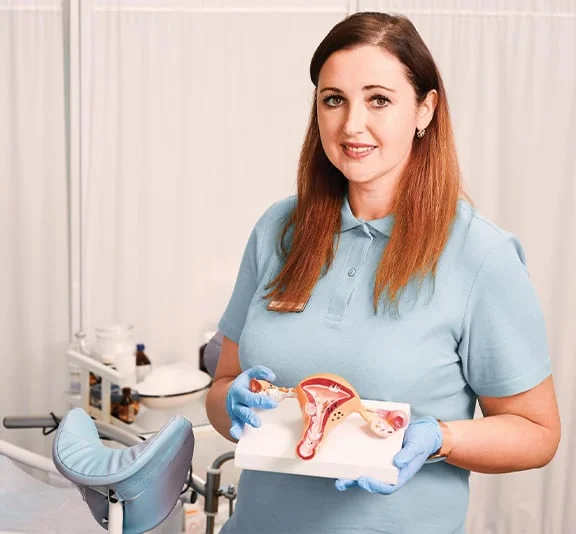.webp)
.webp)
Here every treatment is backed by the experience of a competent team of doctors, committed to patient-centric care. Surya Hospitals is outfitted with the most up-to-date technology and equipment for the detection and treatment of ovarian cysts. This guarantees that patients receive precise diagnoses and effective treatment.

Ovarian Cysts are fluid-filled sacs that form inside the ovaries. Despite being very common the majority of cysts go unreported as these tend to be asymptomatic.
Although any female can develop ovarian cysts, they are frequent in women of reproductive age.
While some cysts are completely harmless and go away naturally, within a few months, others, especially larger ones, might give rise to complications like internal bleeding and necessitate the need for medical attention.
Ovarian Cysts can be categorized into several different types, which include;
Despite having Ovarian Cysts, it is quite possible that you may not experience any symptoms at all, as these tend to be asymptomatic in many cases.
Yet, you need to watch out for the following symptoms and consult our experts at Surya Hospital for a thorough evaluation and precise diagnosis:
Although the specific cause of ovarian cysts is unknown, various variables can raise the risk
.The most significant of these include:
While Ovarian Cysts are not cancerous in the majority of cases, some of these, known as complex ovarian cysts, can be malignant.
The chances of an ovarian cyst being linked to cancer are rare in menstruating women and relatively higher in those who have already hit menopause.
Certain types of Ovarian Cysts can lead to infertility, however, if you have been diagnosed with the problem, it does not necessarily mean that you may face problems with conception.
In most cases, it is not the cyst, but rather the underlying cause that could be responsible for causing infertility, such as Endometriosis and Polycystic Ovarian Syndrome.
If you present with symptoms associated with ovarian cysts, our experts will conduct a pelvic examination to assess you. This is followed by imaging tests, which include:
If our team suspects that the cysts are cancerous, a biopsy may be performed by collecting a tissue sample from the ovaries using surgical intervention.
The majority of Ovarian Cysts do not require treatment and will go away on their own.
If the Cyst is large, causes symptoms, or is suspected of being malignant, the following treatment methods may be suggested:
While Ovarian Cysts cannot be prevented, there are several precautions you may take to lessen your chances of developing them. These are some examples:
No, not all Ovarian Cysts require treatments and some go away on their own within a couple of weeks. Treatment is crucial if you are experiencing intense symptoms that are affecting the quality of your life.
No, not all Ovarian Cysts are Cancerous. The chances of a Cyst being Cancerous are quite rare, but never completely impossible.
Foods that prove to be beneficial for women with Ovarian Cysts include:
Walking is a physical activity, which is beneficial for your overall health. It may not necessarily reduce the Cysts but it can effectively help to relieve some symptoms associated with it.
It is good to be curious when it comes to your health, but, it is equally important to put your curiosity to rest by seeking expert opinion. Have more questions related to your health?
Meet the compassionate souls behind our services. Our dedicated team of professionals is here to ensure you receive the best care, always

Meet the compassionate souls behind our services. Our dedicated team of professionals is here to ensure you receive the best care, always
Our commitment to world-class care is reflected in our numerous certifications, awards, and partnerships. Trust in our proven track record of excellence.
